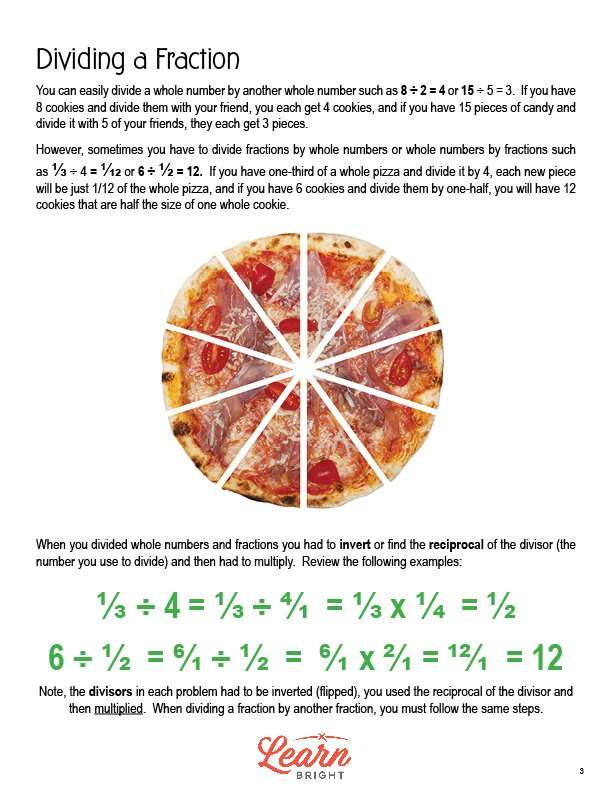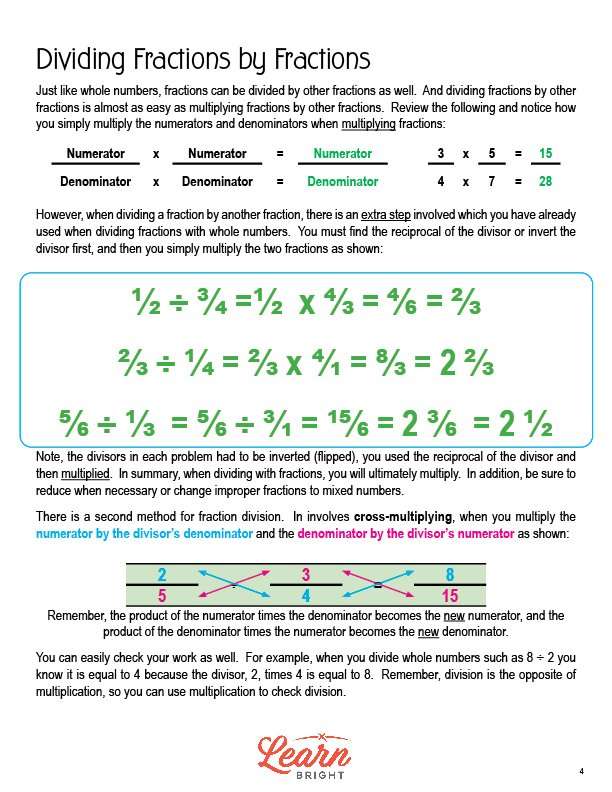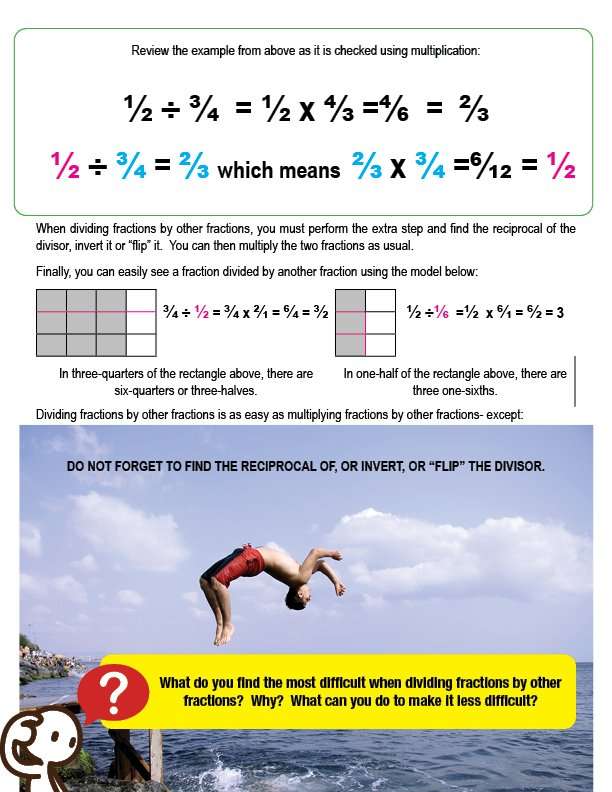Description
What our Divide Fractions by Fractions lesson plan includes
Lesson Objectives and Overview: Divide Fractions by Fractions teaches students how to divide fractions by other fractions, both with and without a common denominator. At the end of the lesson, students will be able to divide a fraction by another fraction and demonstrate the concept using a model or picture. This lesson is for students in 6th grade.
Classroom Procedure
Every lesson plan provides you with a classroom procedure page that outlines a step-by-step guide to follow. You do not have to follow the guide exactly. The guide helps you organize the lesson and details when to hand out worksheets. It also lists information in the blue box that you might find useful. You will find the lesson objectives, state standards, and number of class sessions the lesson should take to complete in this area. In addition, it describes the supplies you will need as well as what and how you need to prepare beforehand. The supplies you need for this lesson include scissors, colored pencils, and poster paper or construction paper.
Options for Lesson
Included with this lesson is an “Options for Lesson” section that lists a number of suggestions for activities to add to the lesson or substitutions for the ones already in the lesson. Several of these suggestions are for the activity worksheet. Instead of the activity sheet squares, students could use colored construction paper to make a model of a fraction division problem. They could also solve more than one problem or display both methods for the activity. You could also assign half of your class one method and the other half of the class the second method, seeing which side can complete them the fastest. Finally, you could conduct a “Mental Math” Fraction Bee using fraction division.
Teacher Notes
The teacher notes page includes a paragraph with additional guidelines and things to think about as you begin to plan your lesson. This page also includes lines that you can use to add your own notes as you’re preparing for this lesson.
DIVIDE FRACTIONS BY FRACTIONS LESSON PLAN CONTENT PAGES
Dividing a Fraction
The Divide Fractions by Fractions lesson plan includes three pages of content. It’s easy to divide a number by another whole number, like 8 ÷ 2 = 4 or 15 ÷ 5 = 3. You might have 8 cookies and split them with your friend, with each of you getting 4 cookies.
However, sometimes you need to divide fractions by whole numbers or whole numbers by fractions, like with 1/3 ÷ 4 = 1/12 or 6 ÷ 1/2 = 12. Maybe you have 1/3 of a pizza and need to divide it by 4. In that case, each piece would be 1/12 of the whole pizza.
To divide whole numbers and fractions you have to invert or find the reciprocal of the divisor (the number used to divide) and then multiply. The lesson includes a few helpful examples. For example, 1/3 ÷ 4 = 1/3 ÷ 4/1 = 1/3 x 1/4 = 1/2. In this problem, we had to invert the divisors and then use the reciprocal of the divisor and then multiplied. This is the correct method to solve these problems!
Dividing Fractions by Fractions
Just like we can divide whole numbers by fractions, we can divide fractions by other fractions. It’s easy! First, when you multiply fractions, all you have to do is multiply the numerators and denominators. For example, for the problem 3/4 x 5/7, we multiply 3 x 5 and 4 x 7 for a final answer of 15/28.
When you divide a fraction by a fraction, there’s an extra step. We used this step when dividing fractions with whole numbers. You have to find the reciprocal of the divisor or invert the divisor first, and then multiply as usual.
For example, to solve the problem 1/2 ÷ 3/4, we invert the divisor and then multiply: 1/2 x 4/3 = 4/6 = 2/3. The lesson shows several other examples of this as well. it’s important to remember to flip the divisor and to reduce the fraction at the end.
Cross-Multiplying
There’s another method that you can use for fraction division. This second method includes cross-multiplying, which is when you multiply the numerator by the divisor’s denominator and the denominator by the divisor’s numerator as shown. The lesson shows a helpful diagram of this.
For the problem 2/5 ÷ 3/4, for example, we multiply 2 x 4 and 5 x 3 to get a final answer of 8/15. The product of the numerator times the denominator becomes the new numerator, while the product of the denominator times the numerator becomes the new denominator.
When solving these problems, it’s easy to check your work using multiplication. For example, 1/2 ÷ 3/4 = 1/2 x 4/3 =4/6 = 2/3. We can check this using multiplcation: 1/2 ÷ 3/4 = 2/3 which means 2/3 x 3/4 =6/12 = 1/2. You can also use a model to help visualize these problems! The lesson includes some models using shaded rectangles.
All of these tips will help you master dividing fractions by fractions! Just remember to always find the reciprocal of the divisor.
DIVIDE FRACTIONS BY FRACTIONS LESSON PLAN WORKSHEETS
The Divide Fractions by Fractions lesson plan includes three worksheets: an activity worksheet, a practice worksheet, and a homework assignment. You can refer to the guide on the classroom procedure page to determine when to hand out each worksheet.
POSTER ACTIVITY WORKSHEET
Students will work with a partner to complete the activity worksheet. Each pair will cut out the squares on the worksheet and use them to create a poster illustrating how to divide a fraction by another fraction. Students should show the steps involved and how to solve the problems, using their creativity and organizational skills.
Students may also work alone or in groups to complete this activity.
MULTIPLICATION PRACTICE WORKSHEET
For the practice worksheet, students will solve 24 multiplication problems.
DIVISION HOMEWORK ASSIGNMENT
The homework assignment asks students to solve 24 division problems.
Worksheet Answer Keys
This lesson plan includes answer keys for the practice worksheet and the homework assignment. If you choose to administer the lesson pages to your students via PDF, you will need to save a new file that omits these pages. Otherwise, you can simply print out the applicable pages and keep these as reference for yourself when grading assignments.









